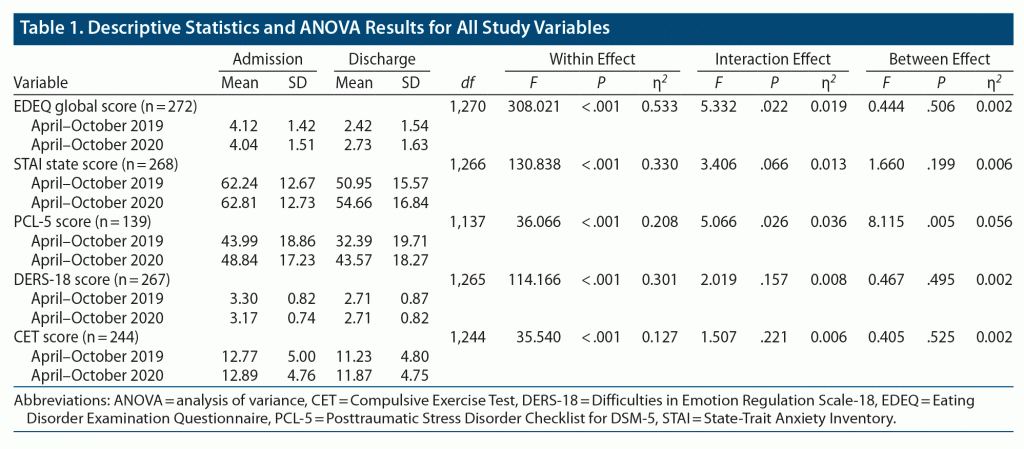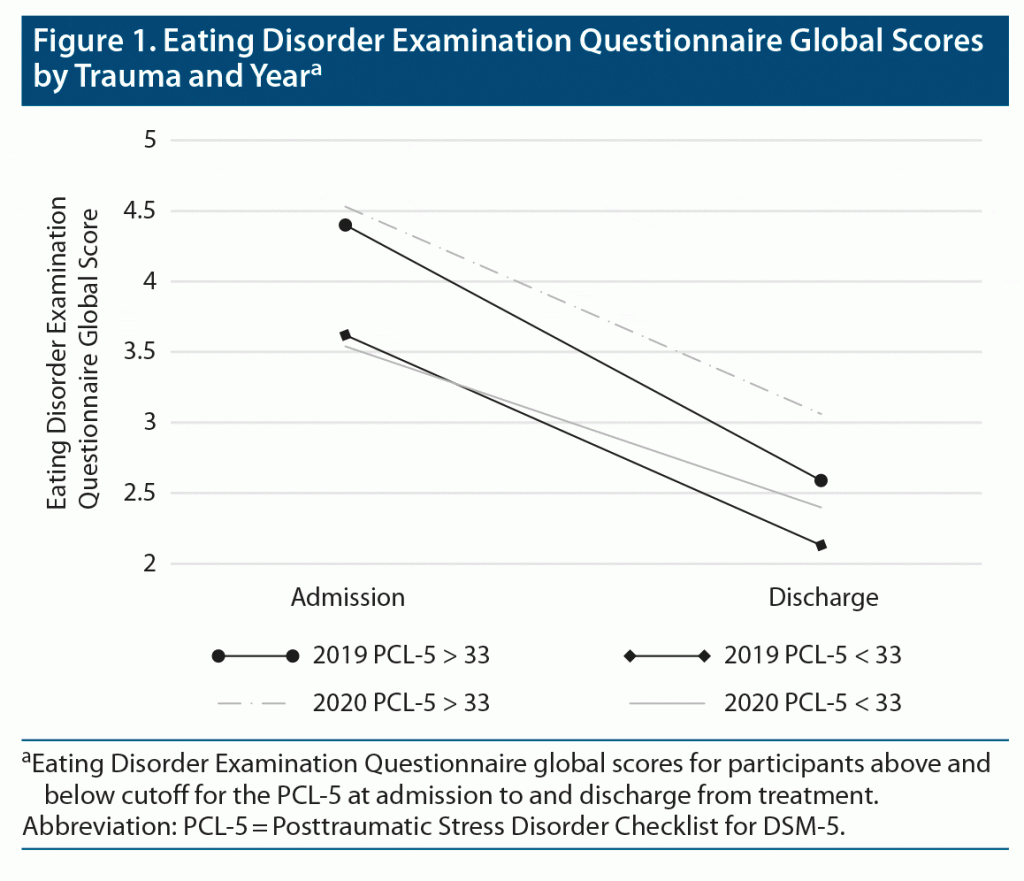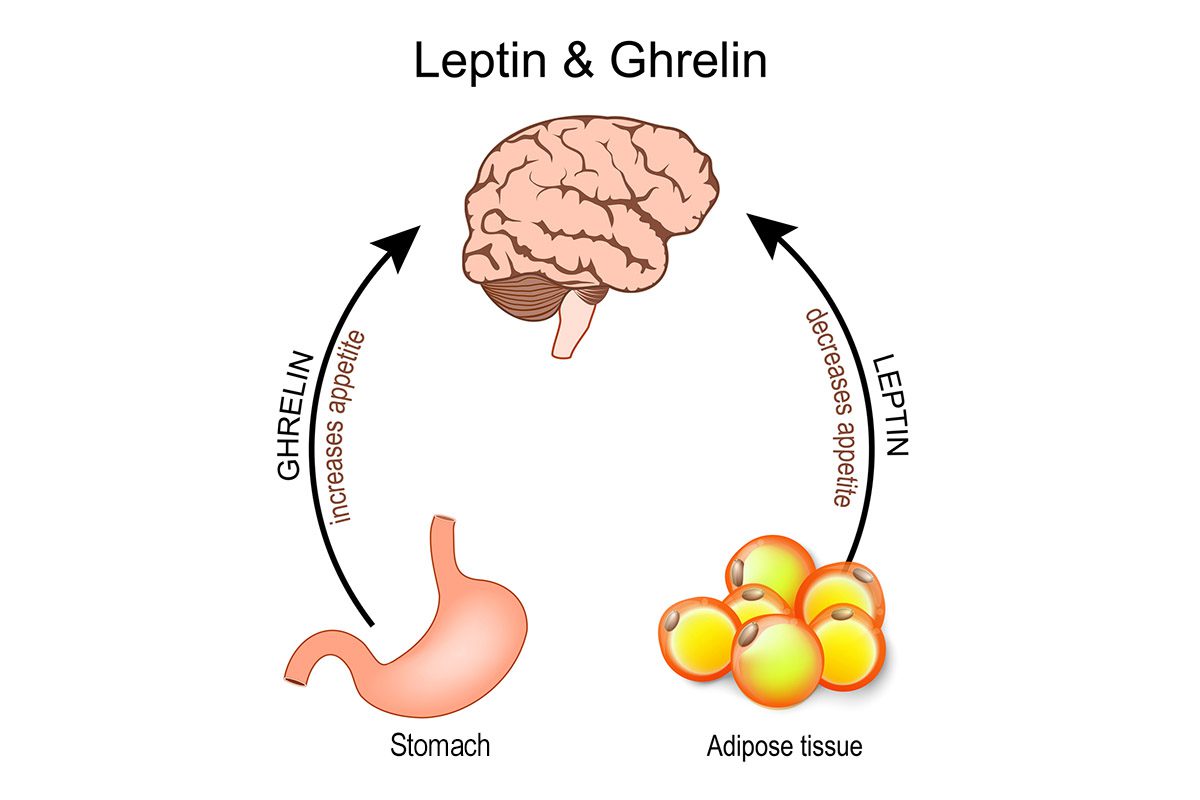
ABSTRACT
Objective: Recent evidence suggests psychosocial stressors stemming from coronavirus disease 2019 (COVID-19) exposure and public health recommendations and policies have exacerbated eating disorder symptoms. Consequentially, eating disorder acuity has increased during the COVID-19 pandemic. Currently, it is still unclear how the COVID-19 pandemic may be impacting individuals receiving treatment for eating disorders at higher levels of care. The purpose of this study was to examine the impact of COVID-19 on eating disorder symptoms and associated outcomes in a sample of individuals receiving eating disorder treatment compared to individuals receiving treatment in 2019.
Methods: Blinded outcomes data from 272 adults who completed treatment at an eating disorder treatment center between April and October of 2019 (pre–COVID-19 group) and 2020 (COVID-19 group) were examined. Repeated measures analyses of variance with Bonferroni correction were used to examine differences in outcome variables and treatment response.
Results: Fewer participants reported trauma in 2020, but symptoms were more severe when present. A significant interaction effect for treatment (eg, admission, discharge) and year (eg, pre–COVID-19, COVID-19) was found for eating disorder and trauma symptoms. Moreover, trauma symptom scores were higher in 2020 than in 2019. The interaction among year, trauma, and treatment was significant (F3,268 = 2.11, P = .027, η2 = 0.034), indicating that individuals with severe trauma in 2020 reported less eating disorder symptom score reduction.
Conclusions: Results extend understanding of effects during the COVID-19 pandemic on treatment-seeking individuals with eating disorders. Clinical implications suggest that greater attention to trauma when screening eating disorder patients and selecting treatment approaches are needed, particularly during the COVID-19 pandemic.
Prim Care Companion CNS Disord 2022;24(1):21m03087
To cite: Cook B, Mascolo M, Bass G, et al. Has COVID-19 complicated eating disorder treatment? an examination of comorbidities and treatment response before and during the COVID-19 pandemic. Prim Care Companion CNS Disord. 2022;24(1):21m03087.
To share: https://doi.org/10.4088/PCC.21m03087
© Copyright 2022 Physicians Postgraduate Press, Inc.
aClinical Department, Alsana, Thousand Oaks, California
bMedical Department, Alsana, Thousand Oaks, California
cDepartment of Psychology, Florida State University, Tallahassee, Florida
*Corresponding author: Brian Cook, PhD, 2545 West Hillcrest Drive, Ste 205, Newbury Park, CA 91320 ([email protected]).
The impact of coronavirus disease 2019 (COVID-19) has extended beyond those who acquire the virus itself to individuals with a variety of mental health conditions.1–3 Strong negative emotional responses to perceived threat and public health recommendations have been proposed as an underlying common factor that may explain how COVID-19 intensifies symptoms in a variety of health conditions, even in those not infected with the virus.4 Specifically, fear of the body (eg, physical vulnerability due to viewing the body as a source of danger and unable to be trusted), fear of others (eg, perception of close interpersonal relationships as a risk in the context of transmission risks), fear of knowing/not knowing (eg, cognitive aspects related to misinformation and dysfunctional beliefs), and fear of inaction (eg, being compelled to perform a behavior lest harm come from inaction, in response to perceived risks) have been theorized as central aspects of emotional responses that may explain the relationship between COVID-19 and mental health outcomes.4 These domains of COVID-19–related fear have been empirically associated with factors that closely match etiologic aspects of eating disorders, such as depression, anxiety, sleep disturbances, somatic symptoms, suicidal ideation, and obsessive-compulsive thoughts.5 Moreover, responding to perceived consequences associated with fears is central to eating disorder development and maintenance.6 Thus, understanding the mental health effects of COVID-19 as a clinically meaningful maladaptive response to strong negative emotions (such as fear), emotional dysregulation, and reduced resources or ability to cope with environmental triggers indicates that individuals with eating disorders are at an increased risk of distress during this pandemic.7
The emerging literature has provided evidence for how psychosocial stressors stemming from COVID-19 public health recommendations and policies may exacerbate eating disorder–related triggers.8 Specifically, constant changes in food availability, limited stock, and compromised access to “safe” foods or routines9,10; an increased focus on and discussions of mortality11; and reduced access to treatment providers or coping responses7 may trigger or exacerbate core aspects of eating cognitions and behaviors. For example, additional eating disorder and anxiety symptoms, increased stress, grazing behavior and emotional eating,12 more restrictive eating behaviors, excessive exercise, binges and purges,13 and fear related to maintaining meal plans10 have been reported by individuals with eating disorders during periods of home confinement. Additionally, individuals with eating disorders have reported increased urges to exercise, anxiety about not being able to exercise, and greater concerns about mental health than physical health.10
Negative affect increases, similar to what has been observed in the literature, are also linked to trauma-related symptoms.14 Moreover, a recent meta-analysis15 of functional magnetic resonance imaging studies found increased fear network alterations are related to trauma. Such functional alterations may provide insight as to why fear triggered by COVID-19 may be linked to heightened anxiety and trauma symptoms. That is, trauma-related symptoms have been observed to be more severe in eating disorder outpatients during COVID-19 lockdown than in healthy controls.16 However, assessments of trauma before COVID-19 were not provided. The finding that elevated trauma scores were observed during the COVID-19 pandemic is not novel, as trauma is well established as an etiologic factor in eating disorders.17 Further research that may inform clinical practice is needed to determine if individuals with eating disorders experience elevated trauma symptoms during the COVID-19 pandemic and if these are more clinically relevant than trauma symptoms independent of COVID-19. Thus, it is still unknown how COVID-19 may affect individuals with preexisting trauma symptoms and eating disorders.
The unique societal changes necessitated by COVID-19 have created an environment of increased risk of symptom exacerbation for individuals with eating disorders and therefore warrant further investigation.1 Specifically, increases in eating disorder symptoms have been quantified as nearly 24 times the odds of increased eating disorder thoughts and 18 times the odds of decreased motivation to recover.18 Therefore, a clear need exists to understand how COVID-19 may affect eating disorder acuity, presentation, and treatment response. Thus, the purpose of this study was to identify clinically relevant differences that may explain eating disorder presentation and inform treatment options by examining the impact of COVID-19 on eating disorder symptoms and associated outcomes in a sample of individuals receiving eating disorder treatment compared to individuals receiving treatment 1 year prior to the pandemic. Our primary aim was to examine if there are differences in how comorbid conditions may impact eating disorder symptoms during the COVID-19 pandemic. We hypothesized that individuals receiving treatment during the COVID-19 pandemic would report higher anxiety,12,18 difficulties with emotional regulation,8 trauma-related symptoms,16 and compulsive exercise10,13 than those receiving treatment pre–COVID-19. Additionally, we were interested in examining treatment response during the COVID-19 pandemic. Therefore, we hypothesized the response to treatment (eg, change in eating disorder symptoms) would be poorer during the COVID-19 pandemic.2,16
METHODS
Participants
Participants were 272 adult individuals (mean [SD] age = 29.07 [10.57], 87.3% female) who completed treatment at a stepped care (ie, residential, partial hospitalization, and intensive outpatient) eating disorder treatment center between April and October 2019 (pre–COVID-19 group) and during 2020 (COVID-19 group). Participants were diagnosed using DSM-5 criteria by clinical interview administered by a trained psychiatrist (anorexia nervosa: 58.5%, bulimia nervosa: 15.4%, binge-eating disorder: 4.7%, avoidant/restrictive food intake disorder: 2.0%, other specified feeding and eating disorders: 19.4%). Groups did not statistically differ by gender (χ26 = 4.382, P = .625), sexual orientation (χ24 = 7.978, P = .092), ethnicity (χ21 = 0.003, P = .092), race (χ25 = 2.048, P = .842), or eating disorder diagnosis (χ24 = 4.002, P = .405). Most clients were admitted to the residential level of care (72.3%) and discharged from the intensive outpatient level of care (43.1%). The distribution of participants at each level of care did not differ at admission (χ22 = 2.581, P = .275) or discharge (χ22 = 4.084, P = .130) between groups. The mean length of stay was 75.61 days (SD=55.84).
Procedure
Blinded outcomes data from an eating disorder treatment center were examined. Data were collected from individuals who received treatment during the first 7 full months of the COVID-19 pandemic in the United States (eg, April–October 2020). For comparison, we also examined data from an independent sample of individuals that received treatment during the corresponding months in 2019. Selecting the corresponding months of the previous year to serve as the pre–COVID-19 group allows a more apt comparison of individuals who receive treatment and avoids seasonal fluctuations in treatment seeking and eating disorder symptoms.19 Similarly, the first 7 months, rather than a shorter time period, were selected to examine the chronic effects of societal changes in response to COVID-19 restrictions and to capture seasonal variations in eating disorder symptoms and treatment seeking.19 All participants received and signed an informed consent form at admission. This study was reviewed and approved by an external institutional review board (Advarra, Inc, Columbia, Maryland).
Treatment
An integrated and adaptive model that includes specialized evidence-based practices in therapy, nutrition, medical, movement/exercise, and relational components of eating disorder care was used.
Analyses
Repeated measures analyses of variance (ANOVAs) were run to determine potential between-group differences (“group” term, ie, 2019 vs 2020) and to examine potential differences in outcome variables from admission to discharge (“treatment” term, ie, treatment effect) in participants. Differences in treatment response were directly measured by the group by treatment interaction term.
Measures
The Eating Disorder Examination Questionnaire (EDEQ)20 was used to assess eating disorder symptoms. The EDEQ includes 28 questions that assess eating disorder cognitions and behaviors during the preceding 28 days. Higher scores indicate more severe eating disorder symptoms. The Cronbach alphas for the EDEQ global score in the current study were α = 0.944 at admission and α = 0.961 at discharge.
The State-Trait Anxiety Inventory (STAI)21 was used to assess both state and trait anxiety. The STAI includes 20 items that assess state anxiety and 20 that assess trait anxiety. The Cronbach alphas in the current study were α = 0.958 at admission and α = 0.982 at discharge.
The Posttraumatic Stress Disorder Checklist for DSM-5 (PCL-5)22 is a 20-item self-report measure of symptoms of posttraumatic stress disorder (PTSD), with higher scores indicating more trauma symptoms. A cutoff of 33 was used to identify participants with trauma symptoms indicative of PTSD.15 The Cronbach alphas in the current study were 0.934 at admission and 0.957 at discharge.
The Difficulties in Emotion Regulation Scale-18 (DERS-18)23 assesses trait-level self-perceived emotion regulation ability. The DERS-18 includes 18 items, with higher scores indicating more difficulty with regulating emotions. The Cronbach alphas in the current study were α = 0.900 at admission and α = 0.935 at discharge.
The Compulsive Exercise Test24 is a 24-item measure of exercise compulsions specific to eating disorders. The Cronbach alphas in the current study were α = 0.933 at admission and α = 0.943 at discharge.
RESULTS
Preliminary Analyses
Means and standard deviations for all study variables are included in Table 1. Fewer participants reported PTSD symptoms in 2020 (62.7%) compared to 2019 (83.2%) (χ21 = 12.689, P < .001).
Between-Group Differences
No differences were observed in eating disorder symptoms, anxiety, emotion regulation, or compulsive exercise between the 2019 and 2020 groups. Between-group effects were not significant for EDEQ global scores (F1,270 = 0.444, P = .506, η2 = 0.002), state anxiety (F1,266 = 1.660, P = .199, η2 = 0.006), emotion regulation (F1,265 = 0.467, P = .495, η2 = 0.002), and compulsive exercise (F1,244 = 0.46, P = .525, η2 = 0.002). However, trauma symptom scores were significantly lower in 2019 than in 2020 (F1,137 = 8.115, P = .005, η2 = 0.056).
Interaction of Group by Treatment
There were no differences in the rate of reduction for anxiety, emotion regulation problems, or compulsive exercise in the 2019 and 2020 groups. The group by treatment interaction effect was not significant for state anxiety (F1,266 = 3.406, P = .066, η2 = 0.013), emotion regulation (F1,265 = 2.019, P = .157, η2 = 0.008), and compulsive exercise (F1,244 = 1.507, P = .221, η2 = 0.006), but was significant for EDEQ global scores (F1,270 = 5.332, P = .022, η2 = 0.633) and trauma symptom scores (F1,270 = 5.066, P = .026, η2 = 0.036). This interaction suggests the reduction in eating disorder and trauma symptoms was different in 2019 and 2020. To further explore the relationship among EDEQ and trauma scores, an ANOVA was run to examine EDEQ scores by year and cutoff on the PCL-5. The interaction among year, trauma, and treatment was significant (F3,268 = 2.11, P = .027, η2 = 0.034) (Figure 1). Bonferroni post hoc test revealed higher EDEQ scores in participants with trauma in 2020 than in those without trauma in 2019 (P = .003) and 2020 (P < .001). Thus, less improvement in eating disorder symptoms was observed after treatment in participants with severe trauma in 2020 than in 2019.
DISCUSSION
The current study identified differences in eating disorder symptoms during versus before the COVID-19 pandemic in samples of individuals receiving eating disorder treatment at higher levels of care. Our first hypothesis was partially supported. That is, only trauma symptom scores were significantly higher at admission during the COVID-19 pandemic compared to admission scores pre–COVID-19. Importantly, the significant group by treatment interaction effect for EDEQ scores supports our hypothesis that treatment response was diminished during the COVID-19 pandemic. The results of this study extend understanding of the impact of COVID-19 on individuals with eating disorders in treatment and may inform key aspects of future research and clinical care during extraordinary circumstances such as the current pandemic.
Observation of higher overall trauma scores and a difference in response to treatment reflects other recent research on the effects of COVID-19 in eating disorders. Previous research has identified increased trauma symptoms as a potential consequence of COVID-19 in individuals with eating disorders16; however, it remained unclear how trauma symptoms during the current COVID-19 pandemic differed from pre-pandemic levels. The results of the current study extend the literature by providing a comparison of trauma symptoms in individuals with eating disorders during the COVID-19 pandemic with an independent sample of individuals pre–COVID-19. Moreover, the significant between effect observed in the current study suggests trauma symptoms for individuals that have experienced trauma were more severe during the COVID-19 pandemic than in the corresponding months 1 year prior. This finding supports previous research suggesting that COVID-19 may trigger fear responses4,5 that manifest as increased trauma symptom acuity.16 Accordingly, the increase in trauma symptoms in individuals entering eating disorder treatment during the COVID-19 pandemic may be due to altered fear-related neural networks because of previous trauma,15 which in turn necessitate eating disorder behaviors to cope with trauma.25 Thus, it is possible that experiencing trauma elicits neural alterations, which then predispose individuals to experience worsened mental health in response to stressors such as those triggered by COVID-19.4,5 Because trauma is strongly linked with the etiology of eating disorders,17 individuals with trauma history and eating disorders may be at increased risk for deterioration of mental health status in response to the widespread stressors25 that occur during the COVID-19 pandemic. Thus, addressing such stressors that may be exacerbated by underlying predispositions to trauma symptoms is necessary for adequate eating disorder treatment,25 particularly during the COVID-19 pandemic.
In the current study, fewer individuals with a history of trauma sought treatment in 2020 than in 2019. This result may be unique to individuals with eating disorders seeking treatment at stepped care treatment centers and is contrary to the overall increase in trauma and deterioration of mental health during the pandemic.1–3 This finding may suggest that individuals with milder trauma might have been less likely to seek care during the pandemic. However, individuals with elevated trauma symptoms at admission had diminished improvement in eating disorder scores from admission to discharge. A possible explanation for this finding is that individuals with trauma symptoms activated by the COVID-19 pandemic may not respond as well to treatment because the threat of future trauma activation related to COVID-19 may necessitate continued use of eating disorder behaviors to prepare for discharge. Moreover, exposure to COVID-19–related information and restrictions activates body distrust, that is, feeling unsafe within and unable to trust one’s body. Distrust of the body is often elevated in both trauma and eating disorders.26,27 Past work describing downstream negative effects of COVID-19 on individuals’ feelings of safety within the body supports this conjecture.4,5 Trauma stabilization interventions as part of evidence-based treatments for PTSD (eg, cognitive processing therapy, eye movement desensitization and reprocessing) may be beneficial in creating trauma stabilization for clients earlier in treatment to allow them to fully address their eating disorder symptoms.
The results of the current study also indicate that compared to other eating disorder subpopulations, individuals with eating disorders receiving treatment at higher levels of care may differ in key aspects of eating disorder comorbidities. That is, contrary to the literature,8,10,12,13 no differences in anxiety or exercise were observed between groups in the current study. Notably, much of the extant literature on COVID-19 has been conducted in community-based samples. Possible explanations for this difference may be that the treatment centers in which this research was conducted included a comprehensive nursing staff and medical team that enforced the Centers for Disease Control (CDC) recommendations. The CDC-guided safety procedures such as wearing masks, plexiglass dividers at meals, continuous screening and testing, and deep cleaning procedures to prevent COVID-19 infections may have provided a sense of safety and thereby reduced anxiety around exposure. While the descriptive nature of the current study precluded assessment prior to admission to treatment, future research is needed to longitudinally assess comorbidities such as anxiety before, during, and after treatment. Moreover, further research is needed to better understand potential differences in clinical profiles of individuals with eating disorders who are likely to seek treatment and those from community-based samples.28
Strengths of the current study include the use of a clinically severe sample, validated measures that can capture a variety of symptoms relevant to eating disorder treatment, and the use of a pre–COVID-19 comparison group. However, the results must be taken in context of several limitations. First, participants received treatment at a residential facility and therefore may represent a treatment-refractory sample. A recent literature review29 found 19%–69% of individuals at residential treatment received previous medical care or hospitalization for their eating disorder and 90%–93% of individuals previously received treatment at other residential centers. Moreover, most participants in the current study were women with anorexia nervosa. Thus, the sample may not be generalizable to all individuals with eating disorders. Second, assessments of factors related to eating disorders before, during, and after treatment are needed. Specifically, results of the current study do not suggest that COVID-19 was the sole factor that may be responsible for differences between groups. Other impacts on society unique to 2020 must be taken into context when interpreting these results. However, COVID-19–specific restrictions were experienced by all participants, while other societal factors were not. Moreover, the results of the current study support other similar research that has documented effects of living during the COVID-19 pandemic on individuals with eating disorders. Finally, depression was not examined in the current study because different assessments were used in 2019 and 2020, as necessitated by changes in The Joint Commission standards.30
CONCLUSION
The current study extends understanding by documenting effects during the COVID-19 pandemic on individuals in an eating disorder treatment center. Throughout the COVID-19 pandemic, psychiatrists have seen the impact of psychosocial stressors such as isolation, fear of the unknown, illness anxiety, financial hardships, and other experiences that can worsen the mental health of their patients. Individuals with eating disorders have specifically been impacted by the COVID-19 pandemic.7,10,12,18 When dealing with eating disorders, co-occurring mental illness symptoms are the rule rather than the exception.31 The current study examined the impact of COVID-19 on eating disorder symptoms and associated outcomes in a sample of individuals receiving eating disorder treatment compared to individuals receiving treatment in 2019. These results help provide psychiatrists an understanding of the multifactorial need for treatment and ways the COVID-19 pandemic may exacerbate eating disorder symptoms and co-occurring illnesses and symptoms.
Submitted: August 2, 2021; accepted November 4, 2021.
Published online: January 20, 2022.
Potential conflicts of interest: None.
Funding/support: This material is based on work supported by the National Science Foundation Graduate Research Fellowship Program under grant no. NSF 1449440.
Role of the sponsor: The supporters had no role in the design, analysis, interpretation, or publication of this study.
Disclaimer: Any opinions, findings, and conclusions or recommendations expressed in this material are those of the authors and do not necessarily reflect the views of the National Science Foundation.
Previous presentation: Presented in a virtual workshop at the International Association of Eating Disorders Professionals Symposium; March 18, 2021.
Clinical Points
- Recognition of comorbidities when working with eating disorder patients is essential to provide appropriate treatment.
- Eating disorder treatment response for participants with trauma was diminished during the COVID-19 pandemic.
- Clinical implications suggest that greater attention to comorbidities, specifically trauma, when screening eating disorder patients and selecting treatment approaches is needed.
References (31)

- Holmes EA, O’Connor RC, Perry VH, et al. Multidisciplinary research priorities for the COVID-19 pandemic: a call for action for mental health science. Lancet Psychiatry. 2020;7(6):547–560. PubMed CrossRef
- Pierce M, McManus S, Hope H, et al. Mental health responses to the COVID-19 pandemic: a latent class trajectory analysis using longitudinal UK data. Lancet Psychiatry. 2021;8(7):610–619. PubMed CrossRef
- Rajkumar RP. COVID-19 and mental health: a review of the existing literature. Asian J Psychiatr. 2020;52:102066. PubMed CrossRef
- Schimmenti A, Billieux J, Starcevic V. The four horsemen of fear: an integrated model of understanding fear experiences during the COVID-19 pandemic. Clin Neuropsychol. 2020;17(2):41–45.
- Schimmenti A, Starcevic V, Giardina A, et al. Multidimensional Assessment of COVID-19–Related Fears (MAC-RF): a theory-based instrument for the assessment of clinically relevant fears during pandemics. Front Psychiatry. 2020;11:748–748. PubMed CrossRef
- Levinson CA, Williams BM. Eating disorder fear networks: identification of central eating disorder fears. Int J Eat Disord. 2020;53(12):1960–1973. PubMed CrossRef
- Rodgers RF, Lombardo C, Cerolini S, et al. The impact of the COVID-19 pandemic on eating disorder risk and symptoms. Int J Eat Disord. 2020;53(7):1166–1170. PubMed CrossRef
- Touyz S, Lacey H, Hay P. Eating disorders in the time of COVID-19. J Eat Disord. 2020;8(1):19. PubMed CrossRef
- Shah M, Sachdeva M, Johnston H. Eating disorders in the age of COVID-19. Psychiatry Res. 2020;290:113122. PubMed CrossRef
- Termorshuizen JD, Watson HJ, Thornton LM, et al. Early impact of COVID-19 on individuals with self-reported eating disorders: survey of ~1,000 individuals in the United States and the Netherlands. Int J Eat Disord. 2020;53(11):1780–1790. PubMed CrossRef
- Janse van Rensburg M. COVID-19, the pandemic which may exemplify a need for harm-reduction approaches to eating disorders: a reflection from a person living with an eating disorder. J Eat Disord. 2020;8(1):26. PubMed CrossRef
- Fernández-Aranda F, Casas M, Claes L, et al. COVID-19 and implications for eating disorders. Eur Eat Disord Rev. 2020;28(3):239–245. PubMed CrossRef
- Phillipou A, Meyer D, Neill E, et al. Eating and exercise behaviors in eating disorders and the general population during the COVID-19 pandemic in Australia: initial results from the COLLATE project. Int J Eat Disord. 2020;53(7):1158–1165. PubMed CrossRef
- Rogers AH, Wieman ST, Baker AW. Anxiety Comorbidities: Mood Disorders, Substance Use Disorders, and Chronic Medical Illness. In: Bui E, Charney M, Baker A, eds. Clinical Handbook of Anxiety Disorders. Current Clinical Psychiatry. Cham: Humana; 2020:77–77.
- Suarez-Jimenez B, Albajes-Eizagirre A, Lazarov A, et al. Neural signatures of conditioning, extinction learning, and extinction recall in posttraumatic stress disorder: a meta-analysis of functional magnetic resonance imaging studies. Psychol Med. 2020;50(9):1442–1451. PubMed CrossRef
- Castellini G, Cassioli E, Rossi E, et al. The impact of COVID-19 epidemic on eating disorders: a longitudinal observation of pre versus post psychopathological features in a sample of patients with eating disorders and a group of healthy controls. Int J Eat Disord. 2020;53(11):1855–1862. PubMed CrossRef
- Rijkers C, Schoorl M, van Hoeken D, et al. Eating disorders and posttraumatic stress disorder. Curr Opin Psychiatry. 2019;32(6):510–517. PubMed CrossRef
- Vitagliano JA, Jhe G, Milliren CE, et al. COVID-19 and eating disorder and mental health concerns in patients with eating disorders. J Eat Disord. 2021;9(1):80. PubMed CrossRef
- Liang CS, Chung CH, Tsai CK, et al. Seasonality of hospital admissions and birth dates among inpatients with eating disorders: a nationwide population-based retrospective study. Eat Weight Disord. 2018;23(2):233–240. PubMed CrossRef
- Fairburn CG, Beglin SJ. Eating Disorder Examination Questionnaire (6.0). In: Fairburn CG, ed. Cognitive Behavior Therapy and Eating Disorders. New York: Guilford Press; 2008: 309–313.
- Spielberger CD. Manual for the State-Trait Anxiety Inventory (STAI). Palo Alto, CA: Consulting Psychologists Press; 1983.
- Blevins CA, Weathers FW, Davis MT, et al. The Posttraumatic Stress Disorder Checklist for DSM-5 (PCL-5): development and initial psychometric evaluation. J Trauma Stress. 2015;28(6):489–498. PubMed CrossRef
- Victor SE, Klonsky ED. Validation of a Brief Version of the Difficulties in Emotion Regulation Scale (DERS-18) in five samples. J Psychopathol Behav Assess. 2016;38(4):582–589. CrossRef
- Taranis L, Touyz S, Meyer C. Disordered eating and exercise: development and preliminary validation of the Compulsive Exercise Test (CET). Eur Eat Disord Rev. 2011;19(3):256–268. PubMed CrossRef
- Brewerton TD, Brady K. The Role of Stress, Trauma, and PTSD in the Etiology and Treatment of Eating Disorders, Addictions, and Substance Use Disorders. In: Brewerton T, Baker Dennis A, eds. Eating Disorders, Addictions and Substance Use Disorders. Berlin, Heidelberg: Springer; 2014: 379–404.
- Brown TA, Berner LA, Jones MD, et al. Psychometric evaluation and norms for the Multidimensional Assessment of Interoceptive Awareness (MAIA) in a clinical eating disorders sample. Eur Eat Disord Rev. 2017;25(5):411–416. PubMed CrossRef
- Brown TA, Vanzhula IA, Reilly EE, et al. Body mistrust bridges interoceptive awareness and eating disorder symptoms. J Abnorm Psychol. 2020;129(5):445–456. PubMed CrossRef
- Thapliyal P, Mitchison D, Mond J, et al. Gender and help-seeking for an eating disorder: findings from a general population sample. Eat Weight Disord. 2020;25(1):215–220. PubMed CrossRef
- Peckmezian T, Paxton SJ. A systematic review of outcomes following residential treatment for eating disorders. Eur Eat Disord Rev. 2020;28(3):246–259. PubMed CrossRef
- Roaten K, Johnson C, Genzel R, et al. Development and implementation of a universal suicide risk screening program in a safety-net hospital system. Jt Comm J Qual Patient Saf. 2018;44(1):4–11. PubMed CrossRef
- Brewerton TD. Eating Disorders, Victimization and Comorbidity: Principles of Treatment. In: Brewerton TD, ed. Clinical Handbook of Eating Disorders: An Integrated Approach. New York: Marcel Dekker, Inc; 2004:509–545.
Enjoy this premium PDF as part of your membership benefits!







